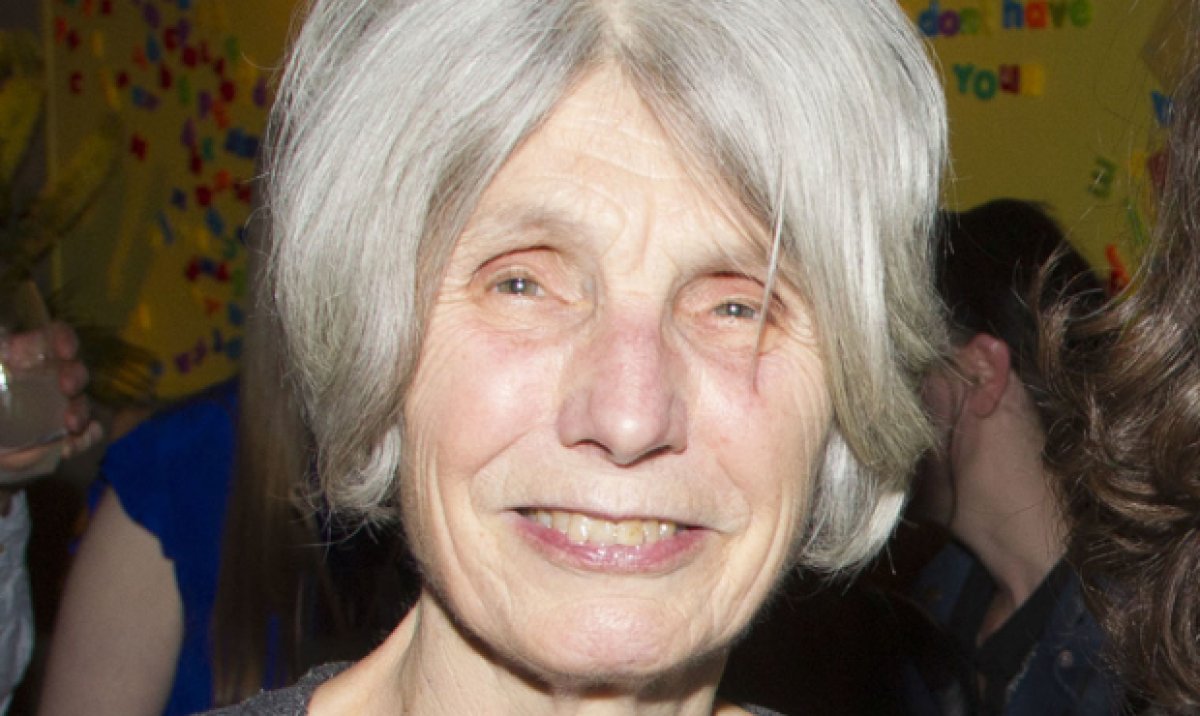British Heritage
Remember, Cherish, Learn.
beta
Caryl Churchill

The Revolutionary Voice of British Theatre.
As a beacon of British heritage, the contribution of Caryl Lesley Churchill to the world of performing arts is profound. Credited as one of the United Kingdom's greatest dramatists, Churchill has masterfully weaved together themes of power abuse, sexual politics, and feminist ideologies through a vast repertoire of non-naturalistic plays, significantly influencing the evolution of contemporary British theatre. From her early explorations of gender and sexuality to her later engagement with surrealistic narratives, Churchill's works are a powerful testament to her incisive socio-political commentary, and an invaluable addition to the canon of British dramatic literature.
Born on 3 September 1938 in Finsbury, London, Caryl Churchill was the daughter of Robert Churchill, a political cartoonist, and Jan Brown, a fashion model and actress. In the aftermath of the Second World War, the Churchills emigrated to Montreal, Canada, where young Churchill spent her formative years attending the Trafalgar School for Girls.
In 1956, she returned to her homeland to pursue university education, and by 1960, she had graduated from Lady Margaret Hall, Oxford, with a BA degree in English Literature. At Oxford, she also received the Richard Hillary Memorial Prize and began her writing career, producing several early plays that were performed by student theatre ensembles. Her play "Downstairs," staged at the National Student Drama Festival in 1958, marked her first major recognition, securing the first prize.
Churchill's professional career saw its inception in the 1960s and 1970s while she was raising a family, during which she started writing short radio dramas for BBC Radio. Her notable works from this period include "The Ants" (1962), "Not, Not, Not, Not Enough Oxygen" (1971), and "Schreber's Nervous Illness" (1972). She also made her mark in television by writing plays for the BBC, many of which were later adapted for the stage.
Her exploration of gender and sexuality through the techniques of Epic theatre in her early work garnered considerable attention. In the mid-1980s, she started incorporating dance-theatre, marking a significant shift in her creative approach. Her play "A Mouthful of Birds" (1986), written in collaboration with David Lan, incorporated surrealistic narratives and referenced the Theatre of Cruelty, a tradition stemming from the works of Antonin Artaud. Churchill's fragmented and surreal narratives began to distinguish her as a leading postmodernist playwright.
In 1972, Churchill debuted on the professional stage with "Owners," a two-act, 14-scene play focused on power obsession. The play established Churchill as a significant figure in the theatre circuit. Her continued exploration of power and its abuse extended to her works during her residency at the Royal Court Theatre from 1974 to 1975, where she was the first female playwright in residence. Her seminal work, "Cloud Nine" (1979), underscored the effects of colonialism and imperialism on personal relationships and leveraged cross-gender casting for a comic yet instructive effect. It earned her an Obie Award in 1982 for the best play of the year in New York.
As Churchill's career progressed, she veered away from the conventions of realism, and feminist themes became the bedrock of her work. In "Top Girls" (1983), she masterfully depicted women relinquishing their humanity to gain power in a male-dominated environment, a narrative that won her another Obie Award. Other acclaimed plays from her extensive catalogue include "Serious Money" (1987), a verse play satirizing Thatcherite Britain's financial excesses, and "Blue Heart" (1997), a profound exploration of communication and identity. She also experimented with musical theatre, collaborating with composer Orlando Gough to create "Hotel" (1997), a choreographed opera set in a hotel room.
Churchill's explorations of identity were further exemplified in "A Number" (2002), a play that grappled with the ethical implications of human cloning. The play won her another Obie Award in 2005. Her play "Drunk Enough to Say I Love You?" (2006) was a critique of British foreign policy's deference to the United States.
Throughout her career, Churchill has shown a deep commitment to innovative theatre, exemplified in the dramatic mosaic of modern consciousness she created with "Love and Information" (2012). The play, featuring 100 characters in over 50 fragmented scenes, portrays our incessant need for human connection and love, encapsulating Churchill's artistic genius and intuitive understanding of the human condition.
Apart from her work in theatre, Churchill has been active in sociopolitical discourse. She is a patron of the Palestine Solidarity Campaign, and in 2009, wrote "Seven Jewish Children – a play about Gaza," a ten-minute play exploring the history of Israel, ending with the 2008 Israeli attack on Gaza. The play was made available for free online, with Churchill encouraging donations to Medical Aid for Palestinians after performances.
Churchill has been vociferously critical of far-right nationalism, xenophobia, and racism. In November 2019, she, along with other public figures, signed a letter supporting Labour Party leader Jeremy Corbyn, describing him as a "beacon of hope" in the face of these growing threats.
Over the course of her career, Churchill has been the recipient of numerous awards and honours, reinforcing her standing as a significant figure in British theatre. Her personal life has been a quiet contrast to her dynamic professional career.
Obie Award for Playwriting for Cloud Nine and Top Girls, the Susan Smith Blackburn Prize for Serious Money, and the Evening Standard Award for Best Comedy of the Year for Serious Money. She was inducted into the American Theatre Hall of Fame in 2018.
She was appointed Commander of the Order of the British Empire (CBE) in the 2002 Queen's Birthday Honours for services to literature and was made a Fellow of the Royal Society of Literature in 2003.
In 2010, Churchill received the 10th annual PEN/Laura Pels International Foundation for Theater Award as a Master American Dramatist.
In 2018, she was awarded the Writer's Guild of Great Britain Award for Outstanding Contribution to Writing.
In 2020, Churchill was awarded the UK's most prestigious theatre award, the Laurence Olivier Special Award, for her sustained excellence and profound impact on contemporary theatre.
Caryl Lesley Churchill, a name etched in British theatrical history, has wielded her pen with unparalleled dexterity, fearlessly traversing unexplored territories and pushing boundaries. Celebrated for her profound exploration of power dynamics, sexual politics, and feminist themes, Churchill has indubitably contributed to the richness of British heritage. Her radical playwriting and innovative non-naturalistic techniques have set her apart from her contemporaries, earning her recognition as "one of Britain's greatest poets and innovators for the contemporary stage." From the likes of Cloud 9 (1979) to A Number (2002), her critically-acclaimed works have consistently pushed theatrical norms, encapsulating the diversity and complexity of the human experience.
Born on September 3, 1938, in Finsbury, London, Caryl Churchill embarked on her life journey as the daughter of a fashion model and actress, Jan Brown, and a political cartoonist, Robert Churchill. At the age of ten, her family moved to Montreal, Canada, where she attended Trafalgar School for Girls. It was in Montreal that her exposure to different cultures and environments began to fuel her distinctively perceptive narrative style.
In 1956, Churchill returned to England to pursue a degree in English Literature from Lady Margaret Hall, Oxford. Her years at Oxford not only brought academic enlightenment but also nurtured her nascent passion for writing. As a student, she began to dabble in playwriting, with her earliest plays, including Downstairs (1958), You've No Need to be Frightened, Having a Wonderful Time (1960), and Easy Death (1962) being performed by student theatre ensembles. Her notable early achievement was the winning of the first prize at the National Student Drama Festival in 1958 for the play, Downstairs.
After graduating from Oxford in 1960, Churchill embarked on a journey that would revolutionize contemporary theatre. Amidst raising a family during the 1960s and 1970s, she started writing short radio dramas for the BBC, including The Ants (1962), Not, Not, Not, Not Enough Oxygen (1971), and Schreber's Nervous Illness (1972).
With an exploratory and experimental approach, Churchill's early work probed gender and sexuality using the modernist theatre techniques of Epic theatre. Her penchant for innovation did not wane with time; in fact, by the mid-1980s, she began incorporating dance-theatre into her writing. This novel confluence of diverse theatrical elements marked her work as distinctly postmodernist, making Churchill a pioneer in her own right.
Churchill's first professionally produced stage play, Owners (1972), a play about obsession with power, marked her "first major theatrical endeavour" and the beginning of a prolific career in professional theatre. Not long after, she served as the resident dramatist at the Royal Court Theatre from 1974 to 1975, a remarkable achievement considering she was the first female playwright to be appointed to this position. Churchill's collaboration with the Joint Stock Theatre Company and the Monstrous Regiment Theatre Company—both of which used an extended workshop period in their development of new plays—led her to adopt a similar improvisational workshop process in developing her plays.
Churchill's seminal work, Cloud Nine (1979), received widespread recognition. This farcical take on sexual politics, set in a British overseas colony during the Victorian era, underscored the effects of colonialism on personal relationships, utilizing cross-gender casting for comic and instructive effect. The play's success resonated beyond the British Isles, earning an Obie Award in 1982 for best play of the year in New York.
Top Girls (1983), another critically acclaimed piece, explored women's loss of humanity in a male-dominated environment. The play, uniquely structured and cleverly employing an all-female cast, won Churchill her second Obie Award for best play in 1983. Churchill's flair for satire was further demonstrated in Serious Money (1987), a verse play predominantly written in rhyming couplets, which skewered the excesses of the Thatcherite financial world. The play earned her the Susan Smith Blackburn Prize and the Evening Standard Award for Best Comedy of the Year.
Churchill's evolution as a playwright continued into the 1990s and beyond. Her 1997 surrealistic short play, This Is a Chair, was well-received, with The Guardian listing it among her best works. The early 2000s saw Churchill tackle themes of human cloning and identity in her play, A Number, which earned her another Obie Award in 2005. Not limiting herself to traditional theatre, Churchill was commissioned in 2010 to write the libretto for a new short opera, A ring a lamp a thing, as part of the Obie Sustained Achievement Award (2001); the Susan Smith Blackburn Prize, 2002, for A Number; the Evening Standard Award, 2002, for A Number; the Obie Best New Play Award, 2002, for Far Away; and the Susan Smith Blackburn Prize, 2012, for Love and Information.
In 2002, she was inducted into the American Theater Hall of Fame. In 2010, she was awarded the Tony Award for Best Revival of a Play for her play A View from the Bridge. She has been awarded honorary degrees from a number of institutions, including the Universities of Kent, East Anglia, Sussex, Essex, York, Oxford, and Roehampton.
In 2018, she was appointed to the Order of the Companions of Honour (CH) for services to drama. She is one of only a few playwrights to have received the honour.
Birth of a Playwright: Early Life and Education
Born on 3 September 1938 in Finsbury, London, Caryl Churchill was the daughter of Robert Churchill, a political cartoonist, and Jan Brown, a fashion model and actress. In the aftermath of the Second World War, the Churchills emigrated to Montreal, Canada, where young Churchill spent her formative years attending the Trafalgar School for Girls.
In 1956, she returned to her homeland to pursue university education, and by 1960, she had graduated from Lady Margaret Hall, Oxford, with a BA degree in English Literature. At Oxford, she also received the Richard Hillary Memorial Prize and began her writing career, producing several early plays that were performed by student theatre ensembles. Her play "Downstairs," staged at the National Student Drama Festival in 1958, marked her first major recognition, securing the first prize.
A Creative Odyssey: Professional Life and Works
Churchill's professional career saw its inception in the 1960s and 1970s while she was raising a family, during which she started writing short radio dramas for BBC Radio. Her notable works from this period include "The Ants" (1962), "Not, Not, Not, Not Enough Oxygen" (1971), and "Schreber's Nervous Illness" (1972). She also made her mark in television by writing plays for the BBC, many of which were later adapted for the stage.
Her exploration of gender and sexuality through the techniques of Epic theatre in her early work garnered considerable attention. In the mid-1980s, she started incorporating dance-theatre, marking a significant shift in her creative approach. Her play "A Mouthful of Birds" (1986), written in collaboration with David Lan, incorporated surrealistic narratives and referenced the Theatre of Cruelty, a tradition stemming from the works of Antonin Artaud. Churchill's fragmented and surreal narratives began to distinguish her as a leading postmodernist playwright.
Reframing Power: Key Plays and Themes
In 1972, Churchill debuted on the professional stage with "Owners," a two-act, 14-scene play focused on power obsession. The play established Churchill as a significant figure in the theatre circuit. Her continued exploration of power and its abuse extended to her works during her residency at the Royal Court Theatre from 1974 to 1975, where she was the first female playwright in residence. Her seminal work, "Cloud Nine" (1979), underscored the effects of colonialism and imperialism on personal relationships and leveraged cross-gender casting for a comic yet instructive effect. It earned her an Obie Award in 1982 for the best play of the year in New York.
As Churchill's career progressed, she veered away from the conventions of realism, and feminist themes became the bedrock of her work. In "Top Girls" (1983), she masterfully depicted women relinquishing their humanity to gain power in a male-dominated environment, a narrative that won her another Obie Award. Other acclaimed plays from her extensive catalogue include "Serious Money" (1987), a verse play satirizing Thatcherite Britain's financial excesses, and "Blue Heart" (1997), a profound exploration of communication and identity. She also experimented with musical theatre, collaborating with composer Orlando Gough to create "Hotel" (1997), a choreographed opera set in a hotel room.
Churchill's explorations of identity were further exemplified in "A Number" (2002), a play that grappled with the ethical implications of human cloning. The play won her another Obie Award in 2005. Her play "Drunk Enough to Say I Love You?" (2006) was a critique of British foreign policy's deference to the United States.
Throughout her career, Churchill has shown a deep commitment to innovative theatre, exemplified in the dramatic mosaic of modern consciousness she created with "Love and Information" (2012). The play, featuring 100 characters in over 50 fragmented scenes, portrays our incessant need for human connection and love, encapsulating Churchill's artistic genius and intuitive understanding of the human condition.
Championing Sociopolitical Discourse
Apart from her work in theatre, Churchill has been active in sociopolitical discourse. She is a patron of the Palestine Solidarity Campaign, and in 2009, wrote "Seven Jewish Children – a play about Gaza," a ten-minute play exploring the history of Israel, ending with the 2008 Israeli attack on Gaza. The play was made available for free online, with Churchill encouraging donations to Medical Aid for Palestinians after performances.
Churchill has been vociferously critical of far-right nationalism, xenophobia, and racism. In November 2019, she, along with other public figures, signed a letter supporting Labour Party leader Jeremy Corbyn, describing him as a "beacon of hope" in the face of these growing threats.
Legacy: Awards, Honours, and Personal Life
Over the course of her career, Churchill has been the recipient of numerous awards and honours, reinforcing her standing as a significant figure in British theatre. Her personal life has been a quiet contrast to her dynamic professional career.
Obie Award for Playwriting for Cloud Nine and Top Girls, the Susan Smith Blackburn Prize for Serious Money, and the Evening Standard Award for Best Comedy of the Year for Serious Money. She was inducted into the American Theatre Hall of Fame in 2018.
She was appointed Commander of the Order of the British Empire (CBE) in the 2002 Queen's Birthday Honours for services to literature and was made a Fellow of the Royal Society of Literature in 2003.
In 2010, Churchill received the 10th annual PEN/Laura Pels International Foundation for Theater Award as a Master American Dramatist.
In 2018, she was awarded the Writer's Guild of Great Britain Award for Outstanding Contribution to Writing.
In 2020, Churchill was awarded the UK's most prestigious theatre award, the Laurence Olivier Special Award, for her sustained excellence and profound impact on contemporary theatre.
Caryl Churchill: Pioneering Artistry and A Legacy in British Theatre
Caryl Lesley Churchill, a name etched in British theatrical history, has wielded her pen with unparalleled dexterity, fearlessly traversing unexplored territories and pushing boundaries. Celebrated for her profound exploration of power dynamics, sexual politics, and feminist themes, Churchill has indubitably contributed to the richness of British heritage. Her radical playwriting and innovative non-naturalistic techniques have set her apart from her contemporaries, earning her recognition as "one of Britain's greatest poets and innovators for the contemporary stage." From the likes of Cloud 9 (1979) to A Number (2002), her critically-acclaimed works have consistently pushed theatrical norms, encapsulating the diversity and complexity of the human experience.
Early Life and Education
Born on September 3, 1938, in Finsbury, London, Caryl Churchill embarked on her life journey as the daughter of a fashion model and actress, Jan Brown, and a political cartoonist, Robert Churchill. At the age of ten, her family moved to Montreal, Canada, where she attended Trafalgar School for Girls. It was in Montreal that her exposure to different cultures and environments began to fuel her distinctively perceptive narrative style.
In 1956, Churchill returned to England to pursue a degree in English Literature from Lady Margaret Hall, Oxford. Her years at Oxford not only brought academic enlightenment but also nurtured her nascent passion for writing. As a student, she began to dabble in playwriting, with her earliest plays, including Downstairs (1958), You've No Need to be Frightened, Having a Wonderful Time (1960), and Easy Death (1962) being performed by student theatre ensembles. Her notable early achievement was the winning of the first prize at the National Student Drama Festival in 1958 for the play, Downstairs.
Exploring and Evolving the Art of Drama
After graduating from Oxford in 1960, Churchill embarked on a journey that would revolutionize contemporary theatre. Amidst raising a family during the 1960s and 1970s, she started writing short radio dramas for the BBC, including The Ants (1962), Not, Not, Not, Not Enough Oxygen (1971), and Schreber's Nervous Illness (1972).
With an exploratory and experimental approach, Churchill's early work probed gender and sexuality using the modernist theatre techniques of Epic theatre. Her penchant for innovation did not wane with time; in fact, by the mid-1980s, she began incorporating dance-theatre into her writing. This novel confluence of diverse theatrical elements marked her work as distinctly postmodernist, making Churchill a pioneer in her own right.
Churchill's first professionally produced stage play, Owners (1972), a play about obsession with power, marked her "first major theatrical endeavour" and the beginning of a prolific career in professional theatre. Not long after, she served as the resident dramatist at the Royal Court Theatre from 1974 to 1975, a remarkable achievement considering she was the first female playwright to be appointed to this position. Churchill's collaboration with the Joint Stock Theatre Company and the Monstrous Regiment Theatre Company—both of which used an extended workshop period in their development of new plays—led her to adopt a similar improvisational workshop process in developing her plays.
Achievements and Notable Works
Churchill's seminal work, Cloud Nine (1979), received widespread recognition. This farcical take on sexual politics, set in a British overseas colony during the Victorian era, underscored the effects of colonialism on personal relationships, utilizing cross-gender casting for comic and instructive effect. The play's success resonated beyond the British Isles, earning an Obie Award in 1982 for best play of the year in New York.
Top Girls (1983), another critically acclaimed piece, explored women's loss of humanity in a male-dominated environment. The play, uniquely structured and cleverly employing an all-female cast, won Churchill her second Obie Award for best play in 1983. Churchill's flair for satire was further demonstrated in Serious Money (1987), a verse play predominantly written in rhyming couplets, which skewered the excesses of the Thatcherite financial world. The play earned her the Susan Smith Blackburn Prize and the Evening Standard Award for Best Comedy of the Year.
Churchill's evolution as a playwright continued into the 1990s and beyond. Her 1997 surrealistic short play, This Is a Chair, was well-received, with The Guardian listing it among her best works. The early 2000s saw Churchill tackle themes of human cloning and identity in her play, A Number, which earned her another Obie Award in 2005. Not limiting herself to traditional theatre, Churchill was commissioned in 2010 to write the libretto for a new short opera, A ring a lamp a thing, as part of the Obie Sustained Achievement Award (2001); the Susan Smith Blackburn Prize, 2002, for A Number; the Evening Standard Award, 2002, for A Number; the Obie Best New Play Award, 2002, for Far Away; and the Susan Smith Blackburn Prize, 2012, for Love and Information.
In 2002, she was inducted into the American Theater Hall of Fame. In 2010, she was awarded the Tony Award for Best Revival of a Play for her play A View from the Bridge. She has been awarded honorary degrees from a number of institutions, including the Universities of Kent, East Anglia, Sussex, Essex, York, Oxford, and Roehampton.
In 2018, she was appointed to the Order of the Companions of Honour (CH) for services to drama. She is one of only a few playwrights to have received the honour.
- Caryl Churchillen.wikipedia.org




